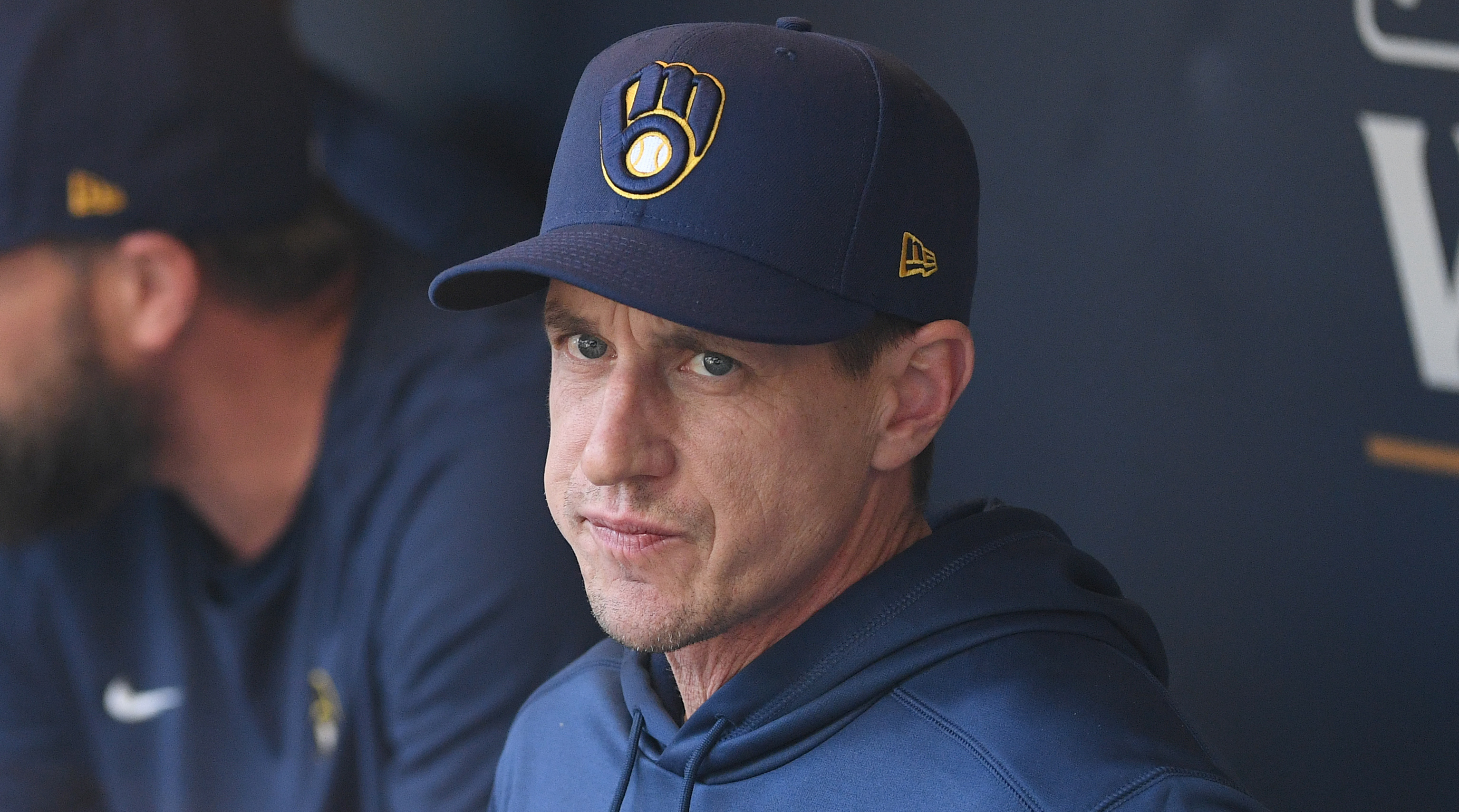Craig Counsell Always Wanted to End Up With the Cubs

As Craig Counsell headed into manager free agency this month, two objectives stood at the top of his wish list: kickstart what had been a fallow financial market for managers and coaches and to honor his Midwestern roots. Only the Cubs could satisfy those two objectives. That is why he is the Chicago manager today.
The results of managerial manic Monday—Counsell to the Cubs, David Ross out of a job in Chicago, Carlos Mendoza to the Mets and Stephen Vogt to the Guardians—seemed shocking in the staccato burst of news. Counsell to the Cubs seemed like the biggest shock of all. But based on Counsell’s roots and desire to get to free agency in the first place, the result makes perfect sense.
The Cubs knew this, which is why they placed a call to him on the first day he was a free agent.
Chicago was very much aware that Counsell grew up and lives in Wisconsin, played at Notre Dame, has sons playing college baseball at Minnesota and Michigan and has two daughters in high school in Wisconsin. “The Midwest [pull] is real,” says one source familiar with negotiations between Counsell and the Cubs.
As the Cubs did their homework, knowing Counsell chose to play this year out rather than sign an extension with Milwaukee, they were told by one of Counsell’s friends, “If he ever managed anywhere else, the Cubs have always been his dream job.”

Counsell became a free agent on Nov. 1, the day after his Milwaukee contract expired. The Cubs called Nov. 1, such was their interest in acquiring what one team source called “one of the one or two best managers in the game.”
By then, the Mets already had contacted Counsell. They jump-started the process when David Stearns, the Mets’ newly hired president of baseball operation, called his old club, Milwaukee, for permission to talk to Counsell before his contract expired. With the money of New York owner Steve Cohen and with the shared history of Stearns and Counsell—seven years together as GM and manager in Milwaukee—the Mets were portrayed as the most likely team to sign Counsell.
There were two problems with that assumption. Stearns did not hire Counsell in Milwaukee. He inherited him when he was named GM in September 2015. They worked well together but were not particularly close, especially as Milwaukee emphasized analytics more in game decisions. Moreover, the Mets’ advantage of money was offset by geography and where the team stands on the winning curve. It is not a plum job despite plum money.
“Over the last few days people were still writing that it looked like it was Counsell’s job,” says a source who spoke to Counsell during that time. “That wasn’t the case. He was all but out over the past few days. New York was not at the top of his list.”
Says one executive, “If you look at recent history, managers don’t come out well on the other side of that job.”
Mendoza will be the sixth named manager of the Mets in the past eight seasons, following Terry Collins, Mickey Callaway, Carlos Beltran, Luis Rojas and Buck Showalter. Going back to Jerry Manuel and Art Howe, the past seven Mets managers have not landed another managing gig after leaving Queens.
Stearns needed a manager with experience and/or a working understanding of the New York landscape. He settled on Mendoza, the former Yankees bench coach who turns 44 this month and has not managed above Class A ball. It comes at a time when the race to identify the next inexperienced managerial whiz has lost its luster as experience returns results. The ages of the past six World Series managers: 58 (Torey Lovullo), 59 (Rob Thomson), 65 (Brian Snitker), 68 (Bruce Bochy), 72 (Dusty Baker) and 73 (Baker).
The Mets were 29 games worse than Atlanta last year, the furthest they have been from first place in 20 years. The job comes with uncertainty in terms of how quickly they can rebuild. Likewise, Counsell’s free agency came just as Milwaukee is staring at a rebuild. Pitcher Brandon Woodruff underwent shoulder surgery and could be out for all of next year. Pitcher Corbin Burnes and shortstop Willy Adames could be traded this winter in advance of pending free agency.
The Cubs, however, are on the upswing, just as they were (if not quite as sharply) when the team dumped incumbent manager Rick Renteria in favor of free agent manager Joe Maddon after the 2014 season. Similarly, the Cubs liked Ross but decided when one of the game’s best managers is available and that person has strong ties to the Midwest, they felt obligated to pursue the top talent.
Chicago gave Counsell $40 million over five years. The annual salary of $8 million is a record, topping the $7.5 million Joe Torre earned from the Yankees more than 20 years ago ($13.3 million in today’s dollars). As analytics grew in baseball, executives became stars, not managers. Executives not only came to earn more than managers but they also reduced the influence of managers by relying on information-backed systems rather than wisdom.
For instance, when the Cubs hired Maddon, they paid him $5 million per year. President of baseball operations Theo Epstein was making $3.7 million. By the time Epstein left he was making $10 million, and the manager/GM balance of power in MLB had flipped.

The financial market for managers cratered in the analytics age. Terry Francona, with two World Series titles, reportedly was the game’s highest paid manager last season at $4.5 million. Maddon’s contract eight years ago (before he won a title) equates to $6.8 million in today’s dollars. Likewise, contracts for major league coaches remain stagnant at a time when the minimum player salary has risen 42% in the past eight years to $720,000.
“That’s one reason why you see so many coaches today who never played in the big leagues,” says one AL coach. “It’s almost like asking, ‘Who wants to coach for $120,000?’ There are a lot of guys who never played who would volunteer in a heartbeat. But if you’re in a big market, with taxes and living expenses, you’re almost working for free.”
The investment in Counsell is a signal that the Cubs are all in next season. You don’t hand out the most lucrative contract for a manager without consolidating that investment on the player side.
Conversely, the Brewers offered Counsell a raise from $3.5 million to $5.5 million but were never going to get to the level of Cubs money. Just days ago, they traded veteran outfielder Mark Canha to Detroit for a minor league reliever, rather than bring him back for $11.5 million or pay a $2 million buyout.
“What I don’t get is why the Brewers just didn’t pay to keep him,” says a source close to Counsell.
Based on how the teams are positioned and market resources, Counsell was worth more to the Cubs than to the Brewers. Milwaukee is scheduled to meet Tuesday morning with Pat Murphy, Counsell’s bench coach and former coach at Notre Dame, about replacing Counsell. Murphy also is expected to be offered a job on Counsell’s staff in Chicago.
Milwaukee could stay in house as it develops young players from its productive farm system, or it could try to take the public relations sting out of losing the franchise’s best manager—to the rival Cubs, no less—by hiring a “name brand” manager. Among those likely choices, according to a source, are Ross and Don Mattingly.
